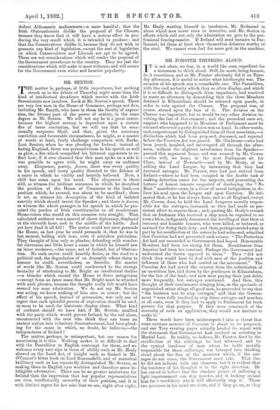MR. SEXTON.
THE matter is, perhaps, of little importance, but nothing struck us in the debate of Thursday night more than the kind of intellectual decadence which service with the Irish Secessionists now involves. Look at Mr. Sexton's speech. There are very few men in the House of Commons, perhaps not five, including Mr. Smyth, who have in them the faculty of expres- sion, the literary part of the power of oratory, in the same degree as Mr. Sexton. We will not say he is a great orator, because the highest oratory is dependent upon a certain fire of inner conviction, but we will say that he occa- sionally surpasses Sheil, and that, given the necessary conviction and favourable circumstance, he might, as a master of words at least, fairly challenge comparison with Burke. Last Session, when he was pleading for Ireland, instead of hating England, there was persuasiveness in his speech as well as glow, a fire which compelled his bitterest opponents to re- flect how, if it ever chanced that this man spoke on a side it was possible to agree with, he might carry an audience away. Eloquence, poetry, finesse, there was every quality in his speech, and every quality directed to the defence of a cause in which he visibly and heartily believed. Now, a chill has come upon his mind. The eloquence is there still, as witness the brilliant sentences in which he described the position of the House of Commons in the land,—a position which, he averred, was about to be sacrificed ; there is art, as witness his description of the kind of isolated sanctity which should invest the Speaker ; and there is finesse, as witness the adroit passages in his speech in which he pro- mised the pardon of Irish constituencies to all recalcitrant Home-rulers who would on this occasion vote straight. That calculated outburst was a marvel of clever diplomacy, displayed at the eleventh hour, and in the middle of the battle. And yet how dead it all fell ! The orator could not once persuade the House, as last year he could persuade it, that he was in hot earnest, boiling with true, even if mistaken patriotism. They thought of him only as pleader, defending with wonder-. ful cleverness and little heart a cause in which he himself saw an inner weakness,—the cause, not of Ireland, but of Obstruc- tion. No such orator could heartily desire, as the road to a political end, the degradation of an Assembly whose claim to honour he could, nevertheless, so describe. No master of words like Mr. Sexton could condescend to the strange brutality of attributing to Mr. Bright an intellectual decline —a blunder which roused the House to fierce antagonism —except from an inner sense that Mr. Bright must be attacked with such phrases, because the thought really felt would have seemed too near admiration. We do not say Mr. Sexton was acting, we know nothing of him save as orator ; but the effect of his speech, instead of persuasion, was only one of regret that such splendid powers of expression should be used, or seem to be used, for histrionic display alone. What kind
of outburst should we have had, if Mr. Sexton, unallied with the party which would govern Ireland by the rod alone, unconnected with the men who think they can tease an ancient nation into voluntary dismemberment, had been plead- ing for the cause in which, no doubt, he believes,—the independence of Ireland ?
The matter, perhaps, is unimportant, but our reason for
mentioning it is this. Nothing makes it so difficult to deal with the Parnellites as English contempt for them, and we welcome every rare sign in them of ability such as Mr. Healy showed on the Land Act, of insight such as flashed in Mr. O'Connor's bitter book on Lord Beaconsfield, and of oratorical brilliancy such as has repeatedly distinguished Mr. Sexton, as making them in English eyes worthier and therefore more in- telligible adversaries. There can be no greater misfortune for Ireland than the impression that her popular representatives are even intellectually unworthy of their position, and it is with distinct regret for her sake that we see, night after night,
Ur. Healy wasting himself in insolences, Mr. Redmond in abuse which now never rises to invective, and Mr. Sexton in efforts which call out only the admiration we give to the pro- fessional fencing-master. If Ireland will send enemies to Par- liament, let them at least show themselves debaters worthy of the steel. We cannot even feel for mere grit in the machine.














































 Previous page
Previous page